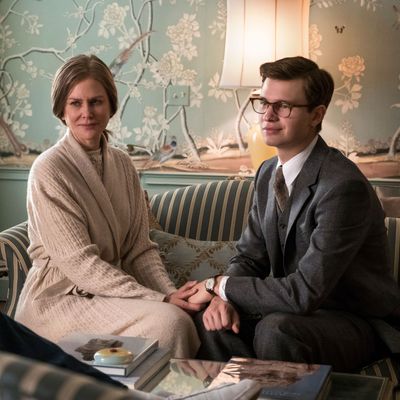
Last week, as we prepared to fly out to Toronto, my colleague Hunter Harris and I were debating which movie on the 2019 slate would be this year’s TIFF disaster. From American Pastoral to Life, Itself, the TIFF bomb has a hallowed legacy among Oscar-watchers as a would-be awards vehicle whose ambitions do not survive first contact with actual North American moviegoers. One of them was surely lurking in this year’s lineup. What would it be?
Halfway through the festival, TIFF seems to have picked this year’s catastrophe: The Goldfinch, John Crowley’s adaptation of Donna Tartt’s Pulitzer Prize–winning novel. The film was one of the crown jewels of this year’s lineup, and after its world premiere Sunday night, the film has been treated to even more scathing reviews than Jojo Rabbit. Collider called it “extremely long and incredibly gross.” Indiewire called it a “stately, lugubrious mess.” These and other, less dismissive reactions were then collected by Jezebel, which announced “Everyone already hates The Goldfinch.” Now, that pendulum has swung back to Toronto: In the press lounge Tuesday afternoon, a few journalists mentioned that they’d dropped the film from their schedules as swiftly as they’d once dropped Life, Itself.
But the thing is, I didn’t hate The Goldfinch! In fact, I didn’t hate The Goldfinch so much that I now feel mildly compelled to defend it. The first misconception I must dispel concerns the booing. The Jezebel post mentions the film debuted to “a warm round of boos, ” which has been picked up by outsiders to mean that the notoriously nice Toronto audience suddenly turned into those jackals at Cannes. However, that reference to booing appears to be metaphorical — I haven’t seen any evidence that the film was booed during its official premiere, and it certainly wasn’t booed during the critics’ screening I attended earlier in the festival. Did my co-attendees that night leave the theater muttering under their breaths about how the movie was an utter piece of shit? Yes, they did. But did they actually boo? No, they did not.
The second misconception I must address is that the film is a lifeless bore. That’s admittedly a matter of taste, but for most of The Goldfinch, I found much to occupy my attention. When people call a movie “handsome,” this is the kind of movie they’re talking about. The Goldfinch takes place in rarefied spaces — a luxurious Upper East Side apartment, an eclectic antiques store in the West Village, a deserted, post-crash version of exurban Las Vegas. Spending time in these places is no substitute for fascinating characters or a crackling plot, but it’s not nothing, either. I spent my whole screening fantasizing about acquiring Jeffrey Wright’s character’s entire wardrobe, and I could think of worse ways to spend two hours.
The third misconception I must dispute concerns the acting. Ever since he broke out with The Fault in Our Stars, Ansel Elgort has been the subject of one frequent criticism: that he seems, in the immortal words of my former colleague Margaret Lyons, “like a chode.” There are some young male stars you actually lose sympathy for the more you see of them, and no question, Elgort is one. (Shia LaBeouf circa 2010 was another.) However, I venture that this actually makes The Goldfinch work better! As an orphan with a tragic past who’s grown into a shady antiques dealer, Elgort’s Theo is supposed to be slightly smug and insufferable. Wanting to punch him in the face is the whole point. And, I venture, many of the supporting performers are legitimately good. Wright and Nicole Kidman are playing roles they’ve played many times before — avuncular mentor and genteel surrogate mother, respectively — but they inhabit each part with genuine warmth. And in a tiny, slimy cameo, Denis O’Hare gets another chance to show why he’s one of our top character actors.
The fourth and final misconception I need to mention is that the film’s editing is a total mess, and here I can only say that this is not a misconception at all. The editing is genuinely baffling: Rather than simply proceeding in chronological order, or flashing back regularly between past and present, the film attempts to mimic Tartt’s time-jumping structure, which doesn’t work at all. We’ll be in the present for 15 minutes, the past for the rest of the first act, back in the present for two scenes, then again in the past for 45 minutes. For a few minutes I was convinced poor Finn Wolfhard’s Boris had been cut from the film entirely, but nope, we just had to spend some completely random time with Ansel before we could get to him. And we haven’t even gotten to the film’s incredibly rushed climax, where you can practically hear the first AD saying “gotta wrap it up, gotta wrap it up” from offscreen.
But even this haphazard editing isn’t enough to make the film a disaster. In the end, I net out somewhere close to Vanity Fair’s Richard Lawson, who wrote that he “left the film appreciative of its style and strong performances, but not emotionally altered in any lingering way.” If I was feeling uncharitable, I could mention that many of the film’s detractors seem to share a certain type of cinephile’s disdain for the sumptuous, the literary, the feminine. But I’m not! So instead I’ll just say that it’s a shame to dub The Goldfinch this year’s disaster when there are still so many more contenders waiting in the wings. There’s one biopic set to screen that I’ve heard is particularly horrid. I can’t wait to see it.


